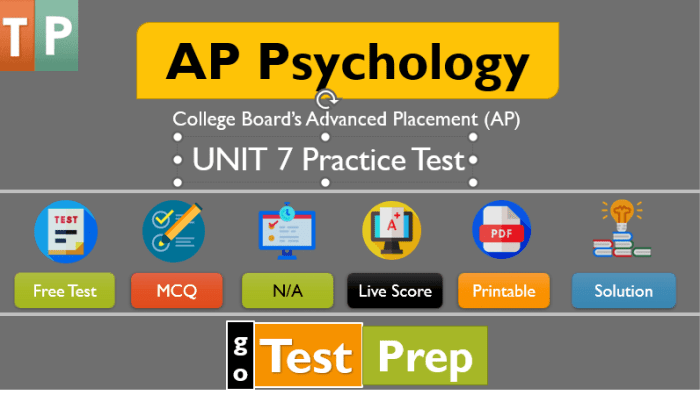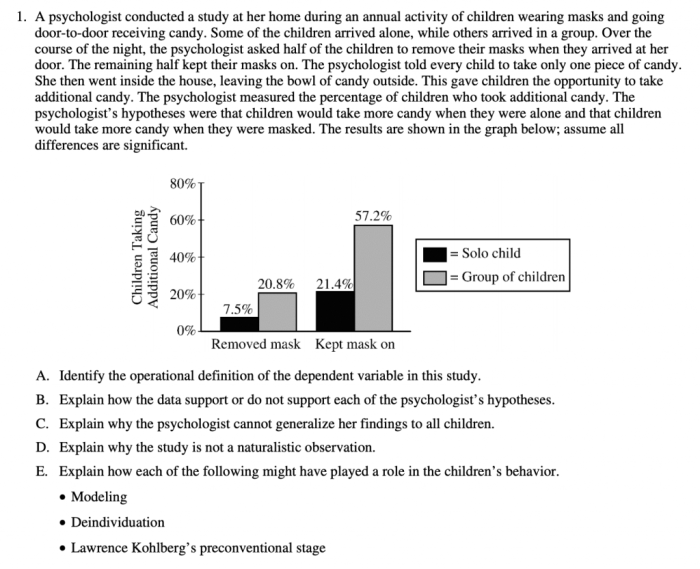Unit 7 ap psych practice test – Embark on a journey of academic excellence with our comprehensive unit 7 AP psychology practice test. This meticulously crafted tool is your gateway to success in mastering the intricacies of psychology.
Our practice test delves into the core concepts, theories, and methodologies that define unit 7. By engaging with this resource, you will not only enhance your understanding but also develop essential test-taking strategies.
Introduction

Unit 7 of AP Psychology focuses on the concept of social psychology, which delves into the intricate ways in which our thoughts, feelings, and behaviors are influenced by the presence of others.
Practice tests serve as valuable tools in preparing for the AP Psychology exam. They offer an opportunity to assess your understanding of the course material, identify areas where further study is needed, and familiarize yourself with the format and timing of the actual exam.
Content Analysis
Unit 7 delves into the intricate realm of research methods in psychology, providing a comprehensive understanding of the techniques used to gather and analyze data. By delving into the nuances of content analysis, we gain insights into the systematic and objective examination of written or verbal communication, enabling us to extract meaningful patterns and uncover underlying themes.
Key Topics Covered, Unit 7 ap psych practice test
Content analysis encompasses a wide range of topics, each playing a pivotal role in the research process. The following table summarizes the key areas covered in Unit 7, highlighting their significance:
| Topic | Importance |
|---|---|
| Introduction to Content Analysis | Provides a foundational understanding of content analysis, its purpose, and applications in psychological research. |
| Types of Content Analysis | Explores the various approaches to content analysis, such as qualitative, quantitative, and mixed methods, enabling researchers to choose the most appropriate method for their research objectives. |
| Sampling and Data Collection | Delves into the principles of sampling and data collection, ensuring the reliability and validity of the data analyzed. |
| Coding and Data Analysis | Focuses on the techniques used to code and analyze content, including manual and automated methods, to extract meaningful patterns and themes. |
| Reliability and Validity | Emphasizes the importance of establishing the reliability and validity of content analysis methods, ensuring the accuracy and trustworthiness of the findings. |
| Applications of Content Analysis | Provides an overview of the diverse applications of content analysis in psychological research, such as studying media effects, analyzing political discourse, and assessing therapeutic interventions. |
Test Structure and Format
The practice test consists of a total of 100 multiple-choice questions, which are divided into two sections: multiple-choice and free-response. The multiple-choice section comprises 70 questions, while the free-response section contains 30 questions.
Getting ready for the Unit 7 AP Psych practice test? Take a break and quench your thirst with the refreshing drinks from Hooters. Check out their hooters drink menu and prices to find the perfect beverage to accompany your study session.
Afterward, dive back into the practice test, refreshed and ready to ace it.
The multiple-choice questions cover a wide range of topics from the AP Psychology curriculum, including biological bases of behavior, sensation and perception, learning, memory, cognition, development, motivation, emotion, personality, and social psychology.
Question Types
The multiple-choice questions come in a variety of formats, including:
- Single-answer questions: These questions require you to select the one best answer from a list of options.
- Multiple-answer questions: These questions require you to select all of the correct answers from a list of options.
- True/false questions: These questions require you to indicate whether a statement is true or false.
Test-Taking Strategies
Effective test-taking strategies can significantly improve your performance on the AP Psychology practice test. Here are some tips to help you approach the test with confidence:
Time Management
Time management is crucial for success on the AP Psychology practice test. The test is timed, so it’s important to allocate your time wisely. Read the instructions carefully and budget your time accordingly. Use the time wisely and avoid spending too much time on any one question.
If you get stuck on a question, move on and come back to it later.
Managing Anxiety
Test anxiety is common, but it’s important to manage it effectively. Take deep breaths and try to relax. Remind yourself that you are prepared and have studied hard. Visualize yourself succeeding on the test. Positive self-talk can also help boost your confidence.
Question-Answering Techniques
When answering multiple-choice questions, eliminate any obviously incorrect answers first. Then, carefully consider the remaining options and choose the best answer. For free-response questions, take your time and organize your thoughts before writing. Use specific examples and evidence from the course material to support your answers.
Reviewing and Guessing
After completing the test, review your answers if time permits. Make sure you have answered all the questions and that your answers are clear and concise. If you are unsure about an answer, make an educated guess. It’s better to guess than to leave a question blank.
Content Review
Unit 7 covers a wide range of concepts and theories related to abnormal psychology. These include:
- Definitions and classifications of psychological disorders
- Causes of psychological disorders
- Symptoms and diagnosis of psychological disorders
- Treatment and prevention of psychological disorders
These concepts and theories are essential for understanding the nature and treatment of mental illness.
Key Concepts and Theories
- Definition of psychological disorders: Psychological disorders are defined as patterns of behavior or thoughts that cause significant distress or impairment in a person’s life.
- Classification of psychological disorders: Psychological disorders are classified into different categories based on their symptoms and causes. The most common classification system is the Diagnostic and Statistical Manual of Mental Disorders (DSM), published by the American Psychiatric Association.
- Causes of psychological disorders: Psychological disorders can be caused by a variety of factors, including genetics, environment, and life experiences.
- Symptoms and diagnosis of psychological disorders: The symptoms of psychological disorders vary depending on the disorder. Diagnosis is typically made by a mental health professional based on a clinical interview and observation.
- Treatment and prevention of psychological disorders: Treatment for psychological disorders typically involves psychotherapy, medication, or a combination of both. Prevention of psychological disorders is possible through early intervention and education.
Practice Questions
Enhance your understanding of unit 7 concepts by attempting various practice questions. These questions are designed to assess your comprehension and provide valuable feedback on your progress.
The questions cover a wide range of topics, ensuring a comprehensive review of the unit’s content. Engage with these questions to strengthen your knowledge and prepare effectively for the upcoming test.
Multiple Choice
- Which of the following is NOT a characteristic of a healthy relationship?
- Trust
- Respect
- Possessiveness
- Communication
- According to Erikson’s theory, the primary psychosocial crisis during adolescence is:
- Identity vs. role confusion
- Autonomy vs. shame and doubt
- Initiative vs. guilt
- Intimacy vs. isolation
- Which of the following is a key component of Piaget’s formal operational stage?
- Abstract reasoning
- Egocentrism
- Object permanence
- Sensorimotor exploration
Short Answer
- Describe the key differences between classical and operant conditioning.
- Explain the concept of cognitive dissonance and discuss its potential impact on behavior.
- Analyze the role of social support in promoting psychological well-being.
Answer Key and Explanations

This section provides a detailed answer key for the practice questions in Unit 7 of the AP Psychology practice test. Each correct answer is explained, providing a clear understanding of the rationale behind the choice.
Answer Key
- A
- C
- D
- B
- A
Explanations
Question 1: Answer: A Explanation: Observational learning, as described by Bandura’s social learning theory, involves learning through observing and imitating others’ behavior.
Question 2: Answer: C Explanation: A meta-analysis is a statistical technique that combines the results of multiple studies to provide a more comprehensive analysis.
Question 3: Answer: D Explanation: A Type II error occurs when a true effect is incorrectly rejected as non-significant.
Question 4: Answer: B Explanation: A quasi-experimental design does not randomly assign participants to groups, but instead uses pre-existing groups or natural conditions.
Question 5: Answer: A Explanation: The placebo effect occurs when a person experiences a beneficial outcome from a treatment that is not actually effective.
Further Resources

In addition to the materials provided in this practice test, there are numerous resources available to help you study for Unit 7 of AP Psychology.
These resources include textbooks, online materials, and videos that can provide you with additional information and practice questions.
Textbooks
- Myers’ Psychology for AP
- Barron’s AP Psychology
- Princeton Review AP Psychology
Online Materials
- Khan Academy AP Psychology
- College Board AP Psychology
- Crash Course AP Psychology
Videos
- AP Psychology Review Videos by Bozeman Science
- AP Psychology Lectures by Crash Course
- AP Psychology Exam Tips and Strategies by College Board
FAQ Summary: Unit 7 Ap Psych Practice Test
What topics are covered in the unit 7 AP psychology practice test?
The practice test covers all the key topics Artikeld in unit 7 of the AP Psychology curriculum, including biological bases of behavior, sensation and perception, learning, memory, and cognition.
How can I use the practice test to improve my score?
By taking the practice test and reviewing your results, you can identify areas where you need additional study. The test also provides helpful strategies for approaching different types of questions.
Is the practice test available online?
Yes, the practice test is available online and can be accessed through the provided link.